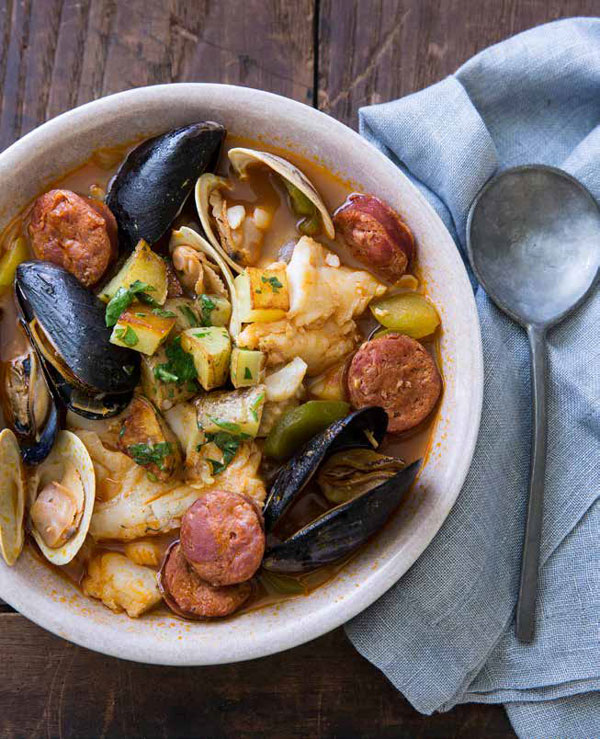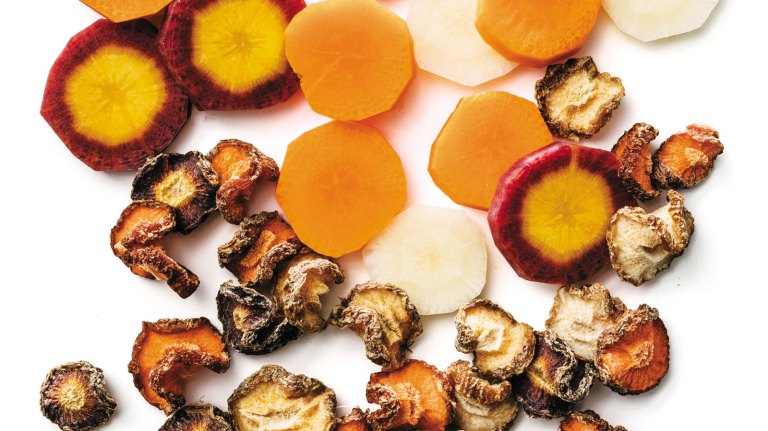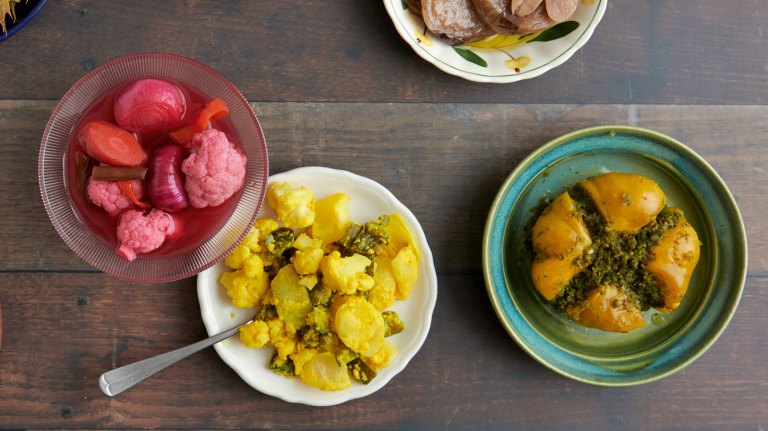Portuguese Seafood Stew with Chouriço
It’s chowder season at last.

In pockets along the East Coast, Portuguese America hides in plain sight — and has for two hundred years or more. In fact, some historians contend that Miguel Corte Real, a Portuguese explorer, came ashore and lived among the Native Americans in the vicinity of New England’s Narragansett Bay a century before the English landed at Plymouth Rock.
Early nineteenth-century whaling captains, knowing that the Portuguese were expert seamen, departed New England ports intending to fill in the balance of their crew with Portuguese recruits from the Azores. After traveling around the globe in pursuit of whales, a good many of these Portuguese sailors signed off back in New Bedford or other Yankee whaling ports, settling there to raise families. Later in the century, other Portuguese people immigrated to seaport towns in Connecticut, Rhode Island, Massachusetts, and New York, seeking to market their well-honed sea-related skills in the New World’s rapidly growing fishing industry.
Portuguese Americans have since thrived and prospered, while at the same time hewing to their original roots in such towns as Fall River, Massachusetts, and Pawtucket, Rhode Island. Family-oriented and community-minded people, they celebrate their heritage with Portuguese festivals, such as the famous Feast of the Blessed Sacrament, which attracts thousands annually to the city of New Bedford, Massachusetts. Portuguese food is a huge draw in these coastal communities — dishes such as deep fried Portuguese sweet dough, grilled linguica sandwiches, bacalhau (a variety of dishes made with salted cod), long-simmered pork, chicken, beef, and goat, and a spicy seafood and pork sausage stew.
Portuguese Seafood Stew with Chouriço
Called caldeirada in Portuguese after the large earthenware vessel it’s cooked in, this magnificent fishermen’s stew is one of Portugal’s supreme contributions to world cuisine. Chouriço, the peppery smoked Portuguese sausage, lends its distinctive flavor, but if you can’t find it you can use any garlicky cooked sausage, such as kielbasa. The stew is finished with a shower of Portuguese gremolata — roasted diced potatoes tossed with cilantro (an often-used herb in Portuguese cooking), parsley, and lemon.
5–6 servings
Ingredients
Stew
- 6 tablespoons olive oil
- 12 ounces chouriço, cut into ½-inch slices
- 2 green bell peppers, seeded and chopped
- 2 onions, chopped
- 4 garlic cloves, finely chopped
- 2 bay leaves, broken in half
- 1 cup dry white wine
- 3 cups bottled clam juice or seafood broth (see Note)
- 1 (14½-ounce) can tomato sauce or purée
- 1 cup water, plus more if needed
- 2 teaspoons smoked paprika
- 30 mussels, scrubbed (about 1¼ pounds)
- 12-18 littleneck clams, scrubbed (see Note)
- 2 pounds firm boneless fish such as haddock or cod, cut into 3-inch chunks
- Freshly ground black pepper
- Salt, if needed
Gremolata
- 1¾ pounds all-purpose potatoes, unpeeled, cut into ½-inch dice (about 5½ cups)
- 3 tablespoons olive oil
- 1 teaspoon salt
- 2 teaspoons grated lemon zest
- 6 tablespoons fresh lemon juice
- ½ cup chopped flat-leaf parsley
- ½ cup chopped cilantro
- Freshly ground black pepper
Directions
For the stew, heat the oil in a very large, heavy soup pot or Dutch oven. Add the chouriço and green bell peppers and cook over medium heat until the mixture browns lightly, about 5 minutes. Remove with a slotted spoon, leaving the drippings in the pot. Add the onion, garlic, and bay leaves, and cook over medium heat until the onion begins to soften, about 5 minutes.
Add the wine, raise the heat to high, and cook until reduced by about half, about 4 minutes. Add the clam juice, tomato sauce, water, and paprika, and bring to a boil. Reduce the heat to medium and cook, covered, for 15 minutes to blend the flavors. Return the sausage and bell peppers to the sauce and heat through. (This base can be made a day ahead; cover and refrigerate.)
Reheat the base if necessary. Add the mussels and clams to the pot and cook, covered, over medium heat until they begin to open, about 5 minutes. Add the fish and continue cooking, covered, until all the bivalves are open and the fish is opaque, about 5 minutes. Season with pepper and, if needed, salt (it will probably not be needed; the sausage and clam juice are salty). Add a bit more water if the stew is not liquid enough. The stew can sit at cool room temperature for up to an hour.
Meanwhile, for the gremolata, preheat the oven to 375°F/190°C. On one or two rimmed baking sheets, toss the potatoes with the oil and salt and spread into a more or less even layer. Roast in the preheated oven for 25 to 30 minutes, or until the potatoes are lightly browned and tender when pierced with a knife. Transfer to a bowl. (Can be made up to 4 hours ahead and held at room temperature. Reheat for a minute or two in the microwave.) Toss the potatoes with the lemon zest, lemon juice, parsley, and cilantro, and season with pepper to taste.
Reheat the stew gently and ladle into shallow bowls, making sure each serving gets an equal number of mussels/clams. Pass the gremolata separately so that guests can sprinkle it on their stew.
Note
Bottled clam juice is usually shelved with the canned fish in the supermarket; seafood broth — in cans or shelf-stable cartons, or in jars as a concentrate — can usually be found with the canned chicken and beef broth. If you can’t get clams, use all mussels.
Recipe excerpted from Chowderland © Brooke Dojny. All rights reserved.
Creamy, hearty, and nourishing, chowder is always satisfying. Packed with recipes for the best chowders and delicious side dishes, Chowderland offers delicious meal ideas for every season.
Cook your own Creamy Clam Chowder, Portuguese Caldo Verde Chowder, Northwest Salmon Chowder with Leeks and Peas, Double Corn Summer Chowder, and more! Brooke Dojny offers 57 recipes for chowders of all kinds — made with meat, seafood, or veggies — plus tasty side dishes, breads, salads, and desserts. Whether you’re looking for a hearty soup on a cozy winter evening or a fresh gumbo perfect for a summer lunch, you’ll turn to this delicious collection again and again.










